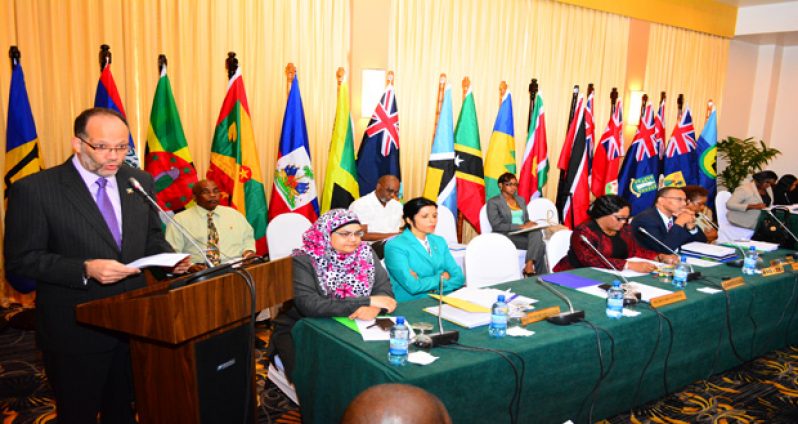SIXTY per cent of Caribbean adults are overweight and the health of the workforce is a major factor which affects CARICOM competitiveness and its ability to maximize opportunities, both within the Single Market and externally, according to CARICOM Secretary-General, Ambassador Irwin LaRocque.The envoy made this disclosure yesterday at the 41st Meeting of the Council for Trade and Economic Development (COTED) held at the Pegasus Hotel, Georgetown. The two-day special session will also address various issues affecting the private sector.
“Our region has consistently been recorded amongst the highest mortality rates related to Non-Communicable Diseases (NCD) of any region in the Americas, with heart diseases and diabetes responsible for the greatest number of deaths. More than half of the adult population has the presence of at least three of the four major risk factors for cardiovascular diseases and diabetes,” the CARICOM Secretary-General disclosed.
He noted that over the last 15 years there has been an exponential rise in diet-related NDCs in the Caribbean. More than 60 per cent of Caribbean adults are overweight; and this is an increasing cause for concern, as well as the rate of obesity in Caribbean children over recent decades.
Seven to 12 per cent of preschool-aged children in the region are estimated to be overweight or obese and up to 14 per cent of adolescence in some member states are obese.
UNHEALTHY DIETS
Ambassador LaRocque said these disturbing statistics point to the need for cross sectorial action to address the burden of unhealthy diets and related NCDs and its impact on productivity and expenditure, both public and private.
In particular, the CARICOM Secretary-General said that some of the areas that lend themselves to action in COTED relate to mandatory nutrition and labeling on all packaged goods, recommendations on measures to encourage the consumption of healthier foods and disincentives for unhealthy foods. Action should also be taken to incentivize production of improved productivity of healthy local foods.
“The seriousness of this issue cannot be overemphasized and this council must join this fight to ensure that there is a healthy workforce to boost competitiveness and productivity by reducing absenteeism in the workplace and the associated cost to the public and private purse respective to healthcare,” LaRocque stressed.
He said the Caribbean Public Health Agency (CARPHA) has prepared a brief which sets out the need for a comprehensive and coordinated regional approach to combat the challenge.
PRIVATE SECTOR
Meanwhile, in addressing the special session of COTED with the private sector, Ambassador LaRocque said “since assuming office as Secretary-General, I have been advocating for the greater involvement in the private sector in the work of this council. The importance of this involvement cannot be overemphasized, given the Community’s commitment to boost growth and employment as underlined in our strategic plan.”
He explained that the private sector is a critical partner with governments to stimulate economic growth in CARICOM, and that partnership is integral to the formation of public policy for regional and national development, in particular in the areas of production, trade, investment and finance.
He added that the CARICOM Secretariat embarked on a consultancy on Caribbean export to examine public and private dialogue within the region with a view to developing a roadmap for improved dialogue towards regional development.
Building on and in support of the work the Community has done in Caribbean export, LaRocque said the secretariat is also working to define an agenda for regional business climate reform. Strength in the public-private linkage will therefore require a deepening of the consultative modes currently used with the engagement of the private sector.
And key to facilitating this necessary dialogue is a representative regional body for the private sector which can reflect the views of the entire spectrum of interest, he added.
He said also that a competitive and vibrant private sector is critical for the deepening of the CARICOM Single Market and Economy (CSME) which is the main tool for building economic resilience and to provide a platform for further integration in the global economy.
The CSME needs to be addressed in order to strengthen the platform and base interface of external partners, LaRocque said. “This includes elements of the regime for trading goods; the application of technical measures, especially trading services and services regulations, investment and commission policy among others.”
He said the objective of that policy must be grounded in the region’s developmental imperatives in the language of the strategic plan, and it must contribute to the building of economic and social resilience. Critically, there must also be coordination between external trade strategies and the community’s foreign policy outreach.
“Such a policy must therefore have the effect of placing regional enterprises of all scales of operation in the best position to take advantage of and participate in global and regional value chains,” he explained.
“We need a dynamic regional programme of trade and investment promotion to compliment the national programmes. This along with trade, research and market information would help to further identify CARICOM’s opportunities in the global economy.”
He concluded that the meeting would help to further strategizes for regional investment promotion prepared by Caribbean export which benefitted from consultation throughout the community.












